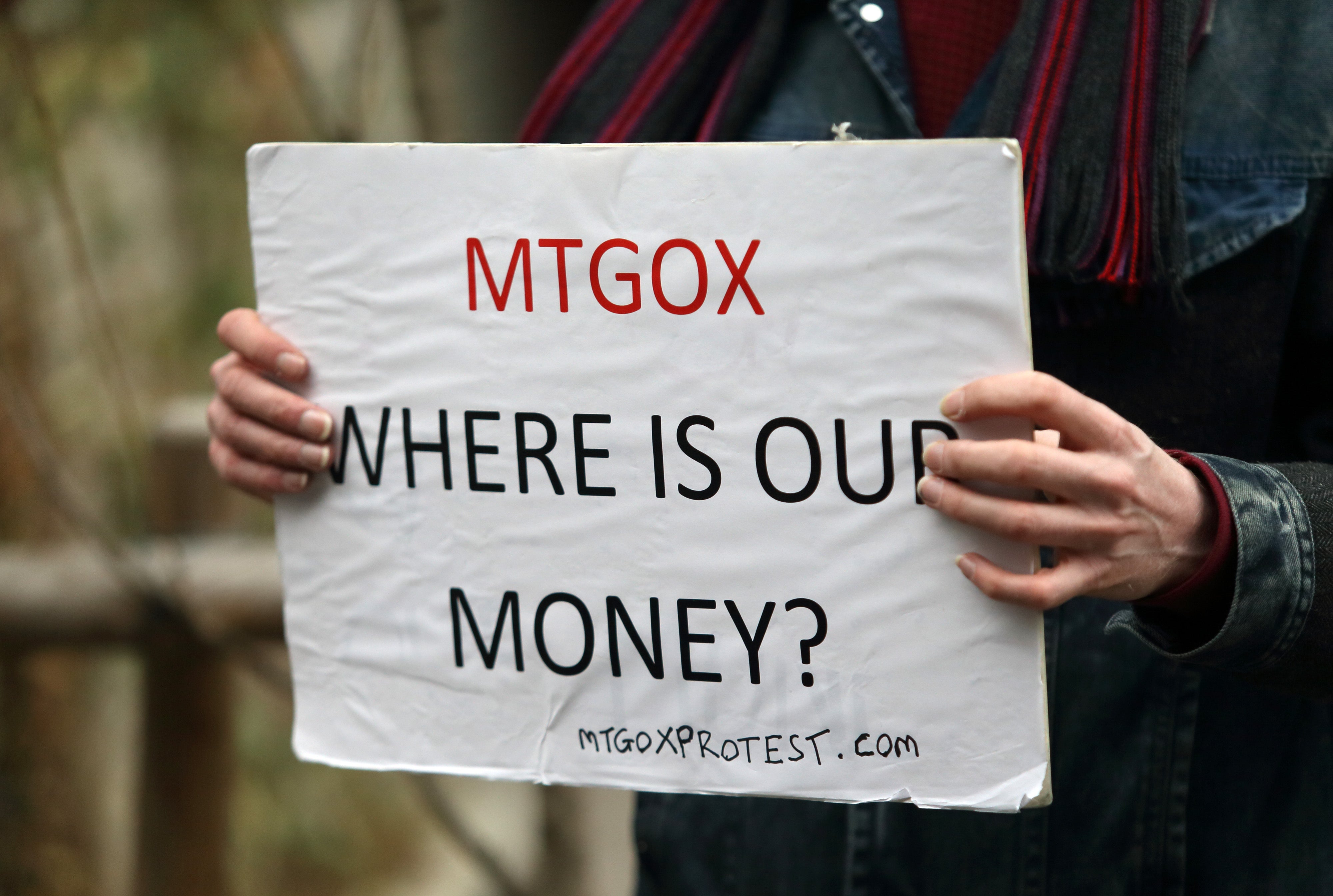Something everyone can agree upon..... customer security and consumer protection must evolve .....
http://www.coindesk.com/bitcoin-industry-must-recognise-responsibilities/
and......
 SEXPAND
SEXPAND

http://www.coindesk.com/bitcoin-industry-must-recognise-responsibilities/
Why The Bitcoin Industry Must Recognise Its Responsibilities
Published on March 8, 2014 at 14:47 GMT | Analysis, Bitcoin protocol,Mt. Gox, Regulation
Michael Jackson is a software engineer, entrepreneur and venture capital investor at Mangrove Capital Partners.
The most significant issue affecting the adoption of cybercurrencies is the safety of bitcoin holdings.
This is a fundamental deficiency of what is a software-defined asset, totally accessible instantaneously and online. In short, bitcoin’s very characteristics make it too easily accessible for criminals.
Last week we saw Mt. Gox cease to exist, this week Flexcoin. Both closures caused by errors in the companies’ systems, but with likely no recourse for their customers.
We will see more companies go under in this way, without a doubt. So if bitcoin is to widely adopted, the customer must be better protected.
Consumer protection
With existing currencies, you know that if a bank goes down, you are protected and will likely be refunded. In this case, you can say, the balances in the bank (which are effectively virtual too) are zeroed and then reissued by the central bank.
There exist other examples of consumer protection too. In the case of the travel industry, operators pay into a central pool that can be used for compensation in the event of a travel company collapsing. Those that pay into the pool are able to use the consumer protection badge, giving consumers the assurance they need to pay up front for their holidays.
Industry-backed consumer protection schemes are not new. In order to ensure consumer protection and regain trust, we need a similar scheme for digital currencies. By working together to define the criteria for accepting businesses into the scheme and sufficiently vetting each business, the same could be done for bitcoin.
Traceable coins
Of course, some environments are simpler than others. Charter holidays are relatively straightforward while bitcoin is, in practice, much more complex.
The protocol means that while it is easy enough to prove that you own a bitcoin, it is much harder to prove that the original bitcoin has disappeared and that a refund is therefore due.
Bitcoins held by Mt. Gox have seemingly disappeared, but they may still reappear. The bitcoin industry therefore needs a central body capable of cancelling the relevant bitcoin and the same would have to apply to any digital currency.
Some may argue that bitcoin is an ideology as much as a product – an ideology that would be totally destroyed if a governing body was given the power to control it.
Case study
However, the Internet itself has proven huge decentralized projects can be workable. If there are disputes regarding Internet governance or protocols, they can be escalated so that decisions are made for the greater good of the Internet.
In this case, this is possible because the web is such a large, diverse entity with no single self-interest.
Just now, it is not clear where the responsibility lies and it is important that the open-source nature of bitcoin is preserved – where the only self-interests are those that are building applications and services on top of the cryptocurrency.
The Bitcoin Foundation has the right structure and it could have the jurisdictional capability to reproduce and refund currency.
With many of those involved having significant self-interests – half of them own exchanges of their own – this could be a good thing, as they will be motivated to regain the trust of bitcoin users.
New challenges
As is often the case with bitcoin, asking one question raises many more. Yet while there is still so much to be worked out, many of the challenges arising are not ones that haven’t been overcome before.
Similarly, there are many other technologies that were once unproven or unpopular, but are now multi-billion-dollar industries. It’s clear, however, that it will require effort, investment and trust between the various different components to take bitcoin forward.
Without renewed effort to gain consumer trust, this industry may die before it even reaches childhood. All bitcoin companies need to collect a levy, used to compensate unfortunate consumers. Some would call this a tax. Maybe bitcoin isn’t so far from the real world after all.
and......
Whistleblower Threatens to Expose Corruption at Bitcoin Foundation
 SEXPAND
SEXPAND
If a breathless car chase wasn't cinematic enough to make you care about Bitcoin, how about a whistleblower threatening to publish an expose about corrupt elders and ominously signing off: "You have 72 hours"?
An "entrepreneur and former venture capitalist" who goes by the handle the Two-Bit Idiot declared "war" today in a blog post entitled Coup or Death for the Bitcoin Foundation? The blogger, whose name is Ryan Selkis, previously talked to Fortune's Dan Primack about leaking documents about Mt. Gox. In today's post, he threatened to publish a searing expose on Monday unless two of its board members resign. TBI also claims that the foundation's corporate sponsors "discouraged" him from airing Bitcoin's filthy laundry.
According to TBI, chairman Peter Vessenes and executive director Jon Matonis are not "ethically entitled" to retain their board seats in the Seattle-based non-profit because conflicts of interest and gross negligence. The most damning allegations are related to the disastrous implosion of Mt. Gox. In the early days, Mt. Gox was the largest Bitcoin exchange and a tent pole for the budding economy, hiding questionable practices.
TBI says Vessnes and Matonis got their money out through connections with Mt. Gox CEO Mark Karpeles, while $473 million swirled down the blockchain drain (emphasis mine):
On Monday, I plan to publish a full article which elaborates on these damning facts and much more:
1) The Foundation never once warned Bitcoin investors about keeping deposits in Mt. Gox, despite clear red flags dating back to at least April 2013. Nor did the Foundation craft or advocate for best practices such as technical transparency, deposit audits, or appropriate consumer protection disclosures. This was a colossal failure of leadership.
2) There is evidence that Bitcoin Foundation board members may have had direct access to Mark Karpeles which allowed them to personally deposit and withdraw funds from Mt. Gox, despite persistent delays for other customers.
3) There is a troubling and inappropriate overlap between Peter Vessenes' staff at his private company, CoinLab, and the Bitcoin Foundation's staff, which goes far beyond shared office space.
4) The current leadership has shown a stunning disregard for proper communications with its members. The importance of immediate resignations (rather than gradual) is highlighted by the Board's secret plans to move the Foundation's headquarters to London without input from members and sponsors.
5) Peter Vessenes has had a nine month conflict of interest regarding Mt. Gox given that his company CoinLab was involved in an active multi-million dollar lawsuit against Mark Karpeles and Mt. Gox, following a failed partnership. Both men remained on the board of directors, and the Foundation failed to draft adequate by-laws that would allow them to address situations such as this where directors had material conflicts, which would compromise their ability to act in the best interests of its members.
This egregious behavior and negligence may not be the worst of the information to come. I have been unable to reach representatives of the Foundation for comment on a myriad of other accounting issues related to the treatment of member donations.
True believers like to tout the fact that Bitcoin is intentionally decentralized, so an industry group like the foundation is about as close to an authority figure or overseer as you're going to get. The agency's website says:
Bitcoin Foundation standardizes, protects and promotes the use of Bitcoin cryptographic money for the benefit of users worldwide.
TBI claims Vessenes and Matonis are at fault, rather than the foundation itself. But it's worth noting that both Krebeles and Charlie Shrem, the indicted founder of BitInstant, were formerly board members:
And for better or for worse, with all of its blue-chip sponsors and leading role to date in events such as the Senate Bitcoin hearings and NYDFS BitLicense hearings, the Foundation is the mouthpiece for the entire industry.Peter Vessenes and Jon Matonis are not scapegoats. They are not innocent bystanders. And they are not ethically entitled to remain in their board seats through later this year.

TBI also claims that the foundation's corporate sponsors told him to keep his mouth shut, but doesn't name said sponsors. This list of platinum, gold, and silverfoundation members mainly includes Bitcoin startups. Previous donors to the foundation include Wordpress and Fred Wilson from Union Square Ventures. Among investors, the most prominent and full-throated support has come from Andreessen Horowitz, which recently invested $25 million in Coinbase.
From TBI's blog post:
At this week's Texas Bitcoin Conference, I was fortified by near-unanimous agreement (and, at times, applause) that the current leadership must resign or be forced out of their positions on the Foundation. Yet I have also been warned that I am playing a dangerous game, with cunning and ruthless power brokers. I have been discouraged by corporate sponsors of the Foundation not to make a public stink which would be "counter-productive" and "irresponsible" for Bitcoin. Most would prefer to let the Mt. Gox scandal blow over, but I would rather wipe the slate clean definitively, blood or no.
TBI describes himself as a "truth-teller," making "the business case for #Bitcoin on its journey from speculative investment to world-changing utility" and clearly sees himself as the Edward Snowden of cryptocurrency.
What if someone spends Bitcoin to take him out before he can send documents to The Wall Street Journal, The New York Times, and others? TBI's got it covered:
If I get hit by a bus this weekend, my lawyers will release it.
If you have any information to share about the Bitcoin Foundation, please email nitasha@gawker.com.
Update: A previous version of this post said TBI was anonymous. His name is Ryan Selkis, as he acknowledged in this interview with Fortune.
Ironic but comical ! JP Morgan is concerned about sheeple not paying taxes , I guess Apple will talk about unfair tax implications with bitcoin next - WTF ?
Ironic but comical ! JP Morgan is concerned about sheeple not paying taxes , I guess Apple will talk about unfair tax implications with bitcoin next - WTF ?
JPMorgan's Biggest Concern Is That Bitcoin Will Succeed
Submitted by Tyler Durden on 03/07/2014 21:06 -0500
Via JPMorgan CIO Michael Cembalest,
After digesting all the hyperbole and the pessimism, my biggest concern is not that Bitcoin will fail, but that it or one of its many virtual currency competitors will one day succeed.
In the extreme, Bitcoin may lead to economic activity moving from the regulated economy to the underground “shadow” economy (after all, one of its primary selling points lay in its inability to be traced), even if some Bitcoin recipients faithfully declare it as income.
If this were to happen, the tax burden would fall disproportionately on the regulated economy that remains, creating a lot of unwelcome distortions.
Perhaps this is why there is a clear inverse relationship between the size of a country’s shadow economy and its wealth per capita. In other words, no one likes paying taxes, but when no one actually does pay them, everyone suffers.
Libertarianism has its limits.





No comments:
Post a Comment